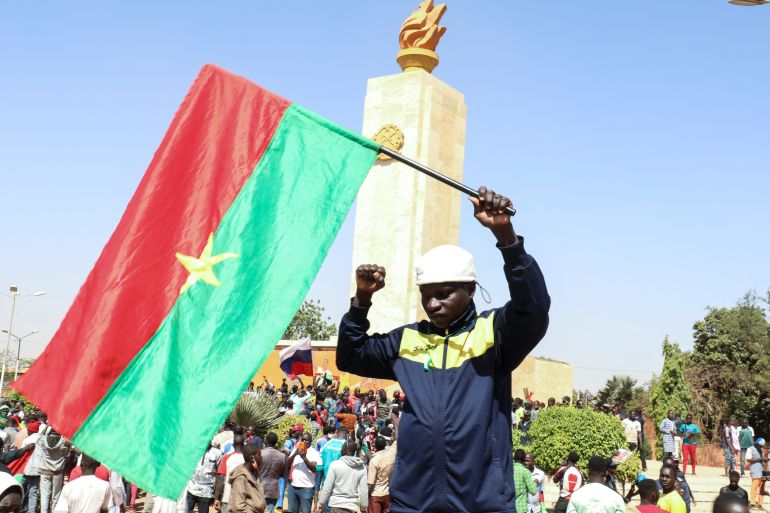ECOWAS holds emergency summit after coups in West Africa
West Africa bloc expected to decide whether to impose more sanctions on Burkina Faso following a military coup.

West African leaders are holding an emergency summit in the Ghanaian capital Accra in response to a recent spate of coups in the region.
The talks on Thursday were initiated after Burkina Faso on January 24 became the third member of the 15-nation Economic Community of West African States (ECOWAS) to be overtaken by the military.
Keep reading
list of 3 itemsAU suspends Burkina Faso after coup as envoys head for talks
ECOWAS suspends Burkina Faso after military coup
Burkina Faso President Roch Marc Christian Kabore was deposed amid public anger at his handling of violence by armed groups.
Burkina Faso followed Mali, where a coup in September 2020 was followed by a second in May 2021, and Guinea, where elected President Alpha Conde was deposed last September.
Thursday talks also come days after the president of Guinea-Bissau, Umaro Sissoco Embalo, survived an attempted coup after assailants armed with machine guns and assault rifles attacked the government palace.
The region’s recent turmoil has stoked fears among ECOWAS countries that efforts to steer West Africa towards stability and democracy are failing.
Thursday’s one-day meeting, scheduled to start at 10:00 GMT, will assess the bloc’s actions moving forward.
ECOWAS chairman Nana Akufo-Addo said at the opening of the summit that a coup in Mali had been “contagious” and had led to subsequent military takeovers in the region.
The trend “must be contained before it devastates our whole region,” Akufo-Addo said.
“This summit will focus on the emerging threats in our region that stem from the military’s interference in Mali and its contagious influence in Guinea and Burkina Faso,” he said.
Al Jazeera’s Ahmad Idris, reporting from Accra, said many countries in the ECOWAS bloc were concerned that the coups could inspire similar actions against their governments.
“The question on everyone’s lips is: what will the West African leaders do to stop these attempts from recurring in the region?” he said.
ECOWAS representatives are expected to discuss the possibility of imposing sanctions on Burkina Faso, adding to its decision to suspend Ouagadougou from the 15-nation bloc. The African Union (AU) has also suspended Burkina Faso from its Peace and Security Council.
The bloc has slapped sanctions on Mali and Guinea for failing to restore civilian rule after military takeovers. Additional measures have included the closure of borders by ECOWAS members, an embargo on trade and financial transactions as well as targeted sanctions against individuals.
Talks in Burkina Faso
The emergency meeting comes after an ECOWAS diplomatic mission led by Ghana’s foreign minister, Shirley Ayorkor Botchwey, met Burkina’s military leaders in Ouagadougou on Monday.
“They seemed very open to the suggestions and proposals that we made. For us it’s a good sign,” Botchwey told reporters after meeting Lieutenant-Colonel Paul-Henri Sandaogo Damiba and other military government members.
The delegation met deposed President Kabore, who appeared to be in “good health”, according to Botchwey.
The ECOWAS delegation was joined by the United Nations’ special representative for West Africa and the Sahel (UNOWAS), Mahamat Saleh Annadif, who described a “very frank exchange”.
On Monday, Burkina Faso’s military government declared it had restored the constitution, which it had swiftly suspended following the coup, and named Damiba as president and head of the armed forces during a transition period.
Damiba on Tuesday met political party chiefs, many of whom said they were keen to take part in the restoration of civilian rule.
While the military government has pledged to re-establish “constitutional order” within a “reasonable time”, questions remain over a date for elections.
Burkina Faso and Mali are in the throes of a nearly decade-old uprising by armed groups that has claimed thousands of lives and forced at least one and a half million people from their homes.
Political friction between ECOWAS and the military in Mali has driven Bamako closer to Russia and cast a shadow over France’s mission in the country to combat armed groups.